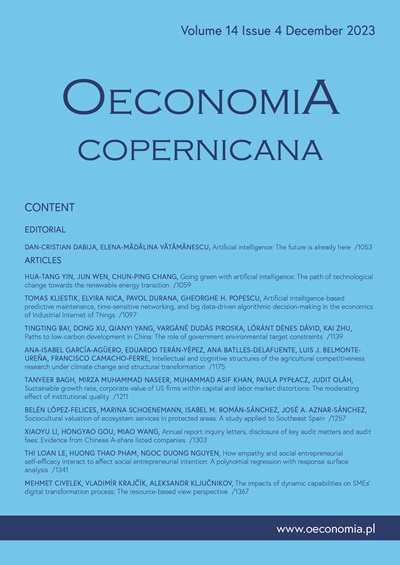Circular economy practices as a tool for sustainable development in the context of renewable energy: What are the opportunities for the EU?
IF 10.8
1区 经济学
Q1 ECONOMICS
引用次数: 0
Abstract
Research background: In order to tackle climate change and ensure Paris agreements are met, countries are forced to look for alternative ways of producing, consuming, and wasting and adopt a circular economy. Reduction of greenhouse gas emissions becomes one of the key elements. The demand for electricity is increasing, and most greenhouse gas emissions derive from the energy sector. Because of that, it is crucial to ensure the transition from fossil fuels to renewable energy. Renewable energy, as a part of the circular economy, also contributes to sustainable development. Only the efficient implementation of circular economy and renewable energy practices can ensure that sustainable development goals are achieved. Purpose of the article: The study aims at determining the efficiency of European Union countries implementing circular economy practices through renewable energy to attain SDGs. The study focuses on the significance of renewable energy as a tool for the circular economy to achieve sustainable development and highlights the progress achieved in SDG through renewable energy in the EU. Methods: For efficiency assessment of the circular economy represented by the renewable energy indicators, data envelopment analysis (DEA) was performed. Findings & value added: This study presents a relation analysis of the circular economy and renewable energy and the importance of efficiency in achieving SDGs through a circular economy. The study helps to understand the circular economy represented by renewable energy and how it transforms into sustainable development and contributes to necessary actions needed for countries to improve. Based on the results, Sweden, Luxembourg, Ireland, Latvia, Estonia, Malta, the Netherlands and Bulgaria are considered the most efficient countries, while Austria is the least efficient. Unused solar and wind power potential can slow down sustainable development; however, EU programs and renewable energy strategies help countries move towards clean energy and ensure efficient implementation of sustainable development goals.在可再生能源背景下,循环经济实践作为可持续发展的工具:欧盟的机遇是什么?
研究背景:为了应对气候变化并确保巴黎协议得以实现,各国被迫寻找生产、消费和浪费的替代方式,并采用循环经济。减少温室气体排放成为关键因素之一。对电力的需求正在增加,而大多数温室气体排放来自能源部门。正因为如此,确保从化石燃料向可再生能源的过渡至关重要。可再生能源作为循环经济的一部分,也有助于可持续发展。只有有效实施循环经济和可再生能源实践,才能确保实现可持续发展目标。文章目的:该研究旨在确定欧盟国家通过可再生能源实施循环经济实践以实现可持续发展目标的效率。该研究侧重于可再生能源作为循环经济实现可持续发展的工具的重要性,并强调了欧盟通过可再生能源在可持续发展目标方面取得的进展。方法:采用数据包络分析(DEA)对以可再生能源指标为代表的循环经济效率进行评价。的发现,增加价值:本研究分析了循环经济和可再生能源的关系,以及通过循环经济实现可持续发展目标的效率重要性。这项研究有助于了解以可再生能源为代表的循环经济,以及它如何转化为可持续发展,并有助于各国采取必要的行动加以改善。根据调查结果,瑞典、卢森堡、爱尔兰、拉脱维亚、爱沙尼亚、马耳他、荷兰和保加利亚被认为是效率最高的国家,而奥地利的效率最低。未利用的太阳能和风能潜力会减缓可持续发展;然而,欧盟的项目和可再生能源战略帮助各国转向清洁能源,并确保有效实施可持续发展目标。
本文章由计算机程序翻译,如有差异,请以英文原文为准。
求助全文
约1分钟内获得全文
求助全文
来源期刊

Oeconomia Copernicana
ECONOMICS-
CiteScore
13.70
自引率
5.90%
发文量
26
审稿时长
24 weeks
期刊介绍:
The Oeconomia Copernicana is an academic quarterly journal aimed at academicians, economic policymakers, and students studying finance, accounting, management, and economics. It publishes academic articles on contemporary issues in economics, finance, banking, accounting, and management from various research perspectives. The journal's mission is to publish advanced theoretical and empirical research that contributes to the development of these disciplines and has practical relevance. The journal encourages the use of various research methods, including falsification of conventional understanding, theory building through inductive or qualitative research, first empirical testing of theories, meta-analysis with theoretical implications, constructive replication, and a combination of qualitative, quantitative, field, laboratory, and meta-analytic approaches. While the journal prioritizes comprehensive manuscripts that include methodological-based theoretical and empirical research with implications for policymaking, it also welcomes submissions focused solely on theory or methodology.
 求助内容:
求助内容: 应助结果提醒方式:
应助结果提醒方式:


